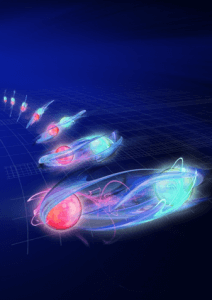Summary
To address questions in modern physics such as “what is the structure of matter inside neutron stars?” we need better computational methods to evaluate the interplay of fundamental forces between elementary particles. To-date the response to such questions rests on numerical computer simulations that are inherently limited. In this project, we develop new theoretical tools for quantum simulations of non-Abelian problems in high energy physics (HEP), and HEP problems beyond one dimension. Our work is conducted in close collaboration with experimental groups to design robust and feasible simulation schemes that are custom-designed to particular quantum platforms. We will integrate methods from machine learning and artificial intelligence to create a conceptually new framework for hybrid quantum-classical simulations. These novel tools are expected to find useful applications beyond HEP in material science and chemistry. Through collaborations with Creative Destruction Lab and the Vector Institute we plan to accelerate the path to industry deployment.
Related Content
Advanced microwave electronics enabling quantum technologies
Summary Superconducting quantum computers require quantum-limited measurements at microwave frequencies in order to implement error correction. Conventionally, this is accomplished using near quantum-limited Josephson Parametric Amplifiers (JPAs). The JPAs require bulky ferrite-based circulators that prevent on-chip integration of the amplifiers with the processor and take up the majority of space and cooling power in the […]
April 1, 2020

Micro-Supercapacitors Based on Termination Optimized MXene Quantum Dots with Ultra-High Rate Capability and Fast Frequency Response
Micro-supercapacitors (MCs) are miniaturized energy storage devices that can enhance the performance of wearable health devices, medical implants, wireless sensors, and micro-electromechanical systems due to their fast frequency response, long life cycle, and vast temperature operation. However, to make these MC systems into commercially feasible products, necessary improvements to current MC performance are necessary, primarily […]
June 12, 2023
Novel High-Speed Receiver for Quantum Communication and Sensing
Summary An essential aspect of a quantum channel is the detection and analysis of quantum signals in the form of photons. For most free-space applications, the photons are polarization encoded, e.g. by assigning the ‘0’ to horizontally polarized photons and ‘1’ to vertically polarized photons. However, where the geometric reference is not constant at all […]
January 1, 2019

Entangled Photon Orbital Angular Momentum Arrays
Summary Arrays of orbital angular momentum (OAM) states of light are a new form of structured light so far relatively unexplored in quantum information science. Unlike spin angular momentum of light, which is related to light’s polarization and covers two dimensions, OAM states, sometimes described as ‘donut beams’ due to the shape of the field […]
September 19, 2019


